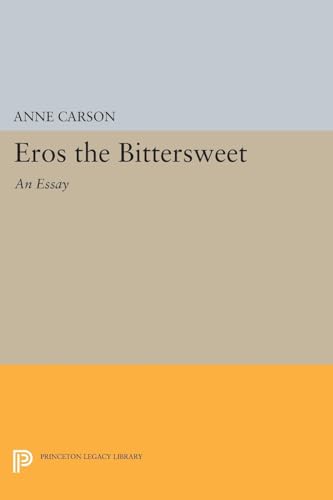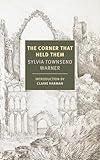Like everyone else’s, my world grew smaller this year. I should have responded by immersing myself in enthralling stories, but I’m no good at escapism. By mid-Spring I found myself incapable of focusing long enough to watch a movie through to the end. Novels were similarly slow going. But there was time to kill. I helped out in some small ways in my neighborhood; I texted more, which I hate doing; I zoomed until zooming became a metonym for working. For long stretches I filled my days with the handful of things I could stand: cooking, listening to Jean Wells and reading Anne Carson.
Carson doesn’t need me to sing her praises. There are few living writers more celebrated than she is. But I have been reading and rereading her first book, Eros: The Bittersweet, since March. I picked it up out of what I thought was intellectual curiosity, though at a remove I can see that the real reason one might find themselves returning throughout the year to a lyrical investigation into the nature of desire is fairly transparent. It was a way to think words I was already thinking, but which there was not much point in expressing. That is in some sense what I’ve always liked about her work. She is a generous writer because she is a straightforward one and I’m a sucker for declarative statements. They are seductive to a reader in their own right, brimming as they are with confidence. Their directness gives you space to decide what to do with them. She opens the book by stating “It was Sappho who first called eros ‘bittersweet.’ No one who has been in love disputes her.” The essay, which is really many smaller essays leaping through time to check in on the development of the idea of “eros,” has as a constant refrain Sappho’s use of “glukupikron,” which Carson explains is translated to bittersweet even though this inverts the more direct rendering: sweetbitter.
The book is often described as concerning itself with “romantic love,” which feels euphemistic. What she’s after is desire, the moment you think “I want you,” meaning something maybe more than, less than, or to the side of “I love you.” Carson isn’t very concerned with whether lust is less noble than love. She just takes it as a fact: people want. There’s no need to pretend otherwise. She is specifically concerned with the instantaneous paradox of desire. The lover wants because they lack and the lack is bitter even if the wanting is sweet. “It is the edge,” she asserts, “separating my tongue from the taste for which it longs that teaches me what an edge is.” The whole action of eros is obliterated when it’s actually sated. Reading her argument I thought I get why this is called obscene. It’s too much. Archilochos concurs about the effect of this muchness when he writes “Oh comrade, the limb-loosener crushes me: desire.” Trying to be good to someone you love can break your heart if you let it and sometimes even if you don’t. But desire can break you first.
Jean Wells knew something about this, too, which might be why I couldn’t stop listening to her. She was part of the wave of black performers in the 1950s and 60s who came out of the church and started singing about a different kind of love. Off the strength of the single Have A Little Mercy On Me, a modest hit in 1967, she released the album World! Here Comes Jean Wells. The world didn’t respond. As best I can tell she stopped recording soon after. I first heard her song as a kid, probably on some soul compilation album playing on my way to school. Hers was the kind of voice I’ve always been drawn to. It isn’t the one with the widest range or most precise intonation, but it has the kind of character that makes you believe she believes if not the lyrics then at least their intention. Have A Little Mercy is a short song of few words all meaning sweetbitter. The way she makes mercy hang, her voice fading for a moment on the elongated e, is the whole point of the song. She belts out:
I never, ever thought I’d live to see the day
That I’d be running after a man this way
Baby, you don’t know the effect you have on me
You got my mind all twisted and I can’t wriggle free
Have a little mercy on me, baby
Wells is embarrassed by her own yearning, by what it does to her. Every sweet little nothing in the song is tinged with a bitterness. What more could you ask for when you’ve got a fool like me? I’m getting what I deserve because I’m where I want to be. Desire makes a fool of you. Nobody who has wanted disputes her.
Carson’s writing is well-suited to the topic. Her text is plainspoken, but exacting with a lurking brutality, like when she describes a lover and beloved “matched together like two sides of one knucklebone.” Not exactly romantic, but certainly corporeal. I squeezed at my own knucklebones and thought ok, maybe a little romantic. The reason I’ve kept returning to the book is because of a section early on, which I first read between bouts of cooking increasingly elaborate stews. She translates a Greek word to “shamefastness” and defines it as “a sort of voltage of decorum discharged between two people approaching one another for the crisis of human contact, an instinctive and mutual sensitivity to the boundary between them.” I put the book down for a week and finished reading Sylvia Townsend Warner’s medieval plague novel The Corner That Held Them. “The crisis of human contact” and “mutual sensitivity to the boundary” were exactly what I did not want to think about. The electricity of the space between people no longer struck me as exciting. It was wearisome now.
Of course Carson and Wells are both right. The irksome thing about yearning is its persistence. It pesters you, makes you lose your words even in an epistolary year. Yearning was all there really was to do, not just in the romantic sense. We lacked, we wanted. A friend once accused me of learning history as a means of self-defense, as though getting a grasp on how we got here would protect me from where we were going. Reading Anne Carson this year was much the same trick: some spell to ward off a new kind of lonesomeness. I spent the whole year wanting: a better world, a reprieve, a stimulus check, to look at someone’s whole face, to have a drink in a bar, to say things differently, to say things well, to be near. Everything of late has had a hard edge, not just the boundaries of would-be lovers.
Once in a while, I look through her book, trying to comprehend something, but I’m not sure what. I imagine she, the classicist, would laugh at me if I told her. Even Cassandra understood that knowing doesn’t protect you from feeling. I keep trying anyway. I cook to pass the time; I eat to mark its passage. I turn on my stereo and wait for the click of the speakers coming to life. An old song again: limb-loosener, have a little mercy on me.
More from A Year in Reading 2020
Don’t miss: A Year in Reading 2019, 2018, 2017, 2016, 2015, 2014, 2013, 2012, 2011, 2010, 2009, 2008, 2007, 2006, 2005










